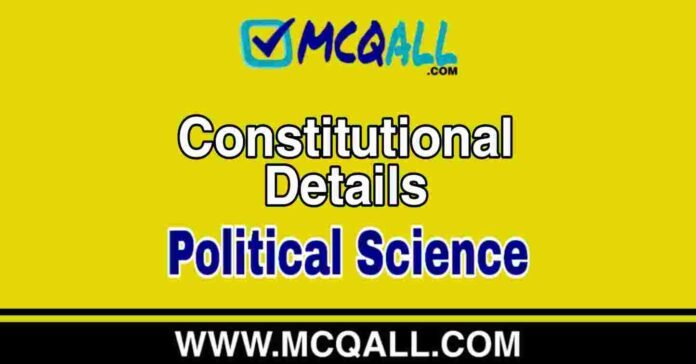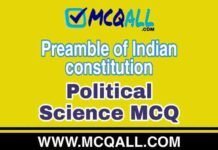Constitutional Details – Political Science MCQ Question and Answer
Constitutional Details – Political Science MCQ Question and Answer : Constitutional Details – Political Science MCQ Question and Answer is given below. This Constitutional Details – Political Science MCQ / Constitutional Details – Political Science Quiz / Constitutional Details – Political Science Question and Answer / Constitutional Details – Political Science Multiple Choice Question, Short Question, Question and Answer, Suggestion, Notes are very important for school, college and various competitive or job exams and interviews.
Those of you who are looking for Constitutional Details – Political Science MCQ Question and Answer, can read the questions and answers given below.
Constitutional Details – Political Science MCQ
- Which of the following Acts introduced a bicameral legisilature at the centre ?
(A) 1961 Act
(B) 1917 Act
(C) 1919 Act
(D) 1915 Act
Answer : 1919 Act
Solution: The Government of India Act, 1919, made Indian Legislature bi-cameral for the first time. It was to consist of an Upper House named the Council of state and a Lower House named the Legislative Assembly. Council of State was composed of 60 members of whom 34 were elected and the legislative Assembly was composed of 114 members of whom 104 were elected
- The Indian Federalism is based the pattern of which country ?
(A) U.S.A.
(B) Canada
(C) Australia
(D) Germany
Answer : Canada
Solution: The Constitution of India is federal in nature. The concept of Federal System in our constitution is inspired from the Constitution of Canada.
- Education which was initially a state subject was transferred to the Concurrent List by the ________ .
(A) 24th Amendment
(B) 25th Amendment
(C) 42nd amendment
(D) 44th amendment
Answer : 42nd amendment
Solution: Through the 42nd Amendment Act of 1976 Five subjects were transferred from State to Concurrent List
- Which one of the following is not the philosophy of the Constitution of India ?
(A) Welfare State
(B) Socialist State
(C) Political Equality
(D) Communist State
Answer : Communist State
Solution: The Philosophy and ideals of the Constitution are reflected in the Preamble of Constitution. India is a democratic republic committed to provide equality of opportunity and status. The Preamble describes socialist state as an ideal to be realised by India. To provide for political equality, India has adopted the principle of ‘Adut Franchise’. Communist state however is not the philosophy of the Constitution of India.
- Which Article of the Indian Constitution is related to the Fundamental Rights against the Exploitation of the Children ?
(A) Article 17
(B) Article 19
(C) Article 23
(D) Article 24
Answer : Article 24
Solution: Article 24 of the Constitution is related to the Right against exploitation of the childern. This Article prohibits the Employment of cheldern under the age of 14 years in any factory, mines or engagement in any other hazardous employment
- Which Article of the Constitution of Indian has the provision of participation of workers in management of industry ?
(A) Article 43
(B) Article 43A
(C) Article 45
(D) Article 47
Answer : Article 43A
Solution: Article 43 A of the Constitution of India provides for participation of worker in management of industries. As per this article the State shall take steps, by suitable legislation or in any other way, to secure the participation of workers in the management of undertaking, establishment or other organization engaged in any industry. This provision was added to the Indian constitution by 42nd Constitutional Amendment Act.
- The president of Indian can dissolve the Lok Sabha on the recommendation of :
(A) Rajya sabha
(B) Election Commision
(C) Chief Justice of India
(D) Cabinet
Answer : Cabinet
Solution: According to Article 85 (2) (b), The president may dissolve House of the people (Lok Sabha) on the advice of Council of Ministers as per Article 74 (1).
- To whom is the Council of Ministers responsible ?
(A) Lok Sabha
(B) President
(C) Speaker of Lok Sabha
(D) Speaker of Lok Sabha and chairman of Rajya Sabha
Answer : Lok Sabha
Solution: The Council of Ministers is collectively responsible to Lok Sabha.
- which Constitutional Amendment has limited the number of Central Ministers to 15% of the numbers of Lok Sabha ?
(A) 90th
(B) 91st
(C) 92nd
(D) None of the above
Answer : 91st
Solution: 91st Constitutional Amendment says that the total number of Ministers, including Prime Minister in the Council of Ministers, shall not exceed fifteen percent of the total number of members of the House. It was added in Article 75(1A) in 2003 after 91st Amendment.
- Which one of the following is not a collective previlege of the members of parliament ?
(A) Freedom of debates and proceedings.
(B) The Rights to regulate the internal matters of the parliament
(C) Freedom from attendance as witness.
(D) The privileges of excluding strangers from the house.
Answer : Freedom from attendance as witness.
Solution: Parliamentary privileges Collective for Parliament Individual to Members • 44th Amend, 1978 restored freedom of press to publish reports of parliament without prior. But not of secret sitting • Exclude strangers from secret • Make rules to regulate its own procedure • Punish members/outsiders for breach of privileges / contempt ( suspension or expulsion). • Right to receive info, of the arrest, detention etc. of a member • Institute inquiries + order attendance of witnesses etc. • Courts can not inquire into proceedings No member from proceedings can be arrested, without the permission of the presiding officer. • Can’t be arrested during session of Parfiament & 40 days befor/after. (privilege NOT available in CRIMINAL cases) • Freedom of speech in Parliament. (Not liable to anything said or vote given in Parliament + committees. • Exempted from jury service. CAN refuse to give evidence and appear as a witness in pending case (if session going on)
Political Science MCQ Question and Answer
See also: – Political Science MCQ Question and Answer Click Here
Constitutional Details – Political Science MCQ Question and Answer
Constitutional Details – Political Science MCQ Question and Answer: Constitutional Details – Political Science MCQ Question and Answer – Constitutional Details – Political Science MCQ Question and Answer has been discussed above.
Constitutional Details – Political Science Multiple Choice Question and Answer
Constitutional Details – Political Science Multiple Choice Question and Answer: Constitutional Details – Political Science Multiple Choice Question and Answer – Constitutional Details – Political Science Multiple Choice Question and Answer discussed above.
Constitutional Details – Political Science Quiz
Constitutional Details – Political Science Quiz : Constitutional Details – Political Science Quiz – Constitutional Details – Political Science Quiz has been discussed above.
Constitutional Details – Political Science Question and Answer in English
Constitutional Details – Political Science Question and Answer in English: Constitutional Details – Political Science Question and Answer in English – Constitutional Details – Political Science Question and Answer in English.
Constitutional Details – Political Science MCQ Question and Answer
If you benefit from this “Constitutional Details – Political Science MCQ Question and Answer” post then our efforts will be successful. Also visit our MCQALL.COM website or follow us on various social networking sites (Telegram, Facebook, Youtube, Instagram, Twitter) to know MCQ – Multiple Choice Question Quiz on various topics, questions and answers quiz from GK and Daily Current Affairs. Thank you.












